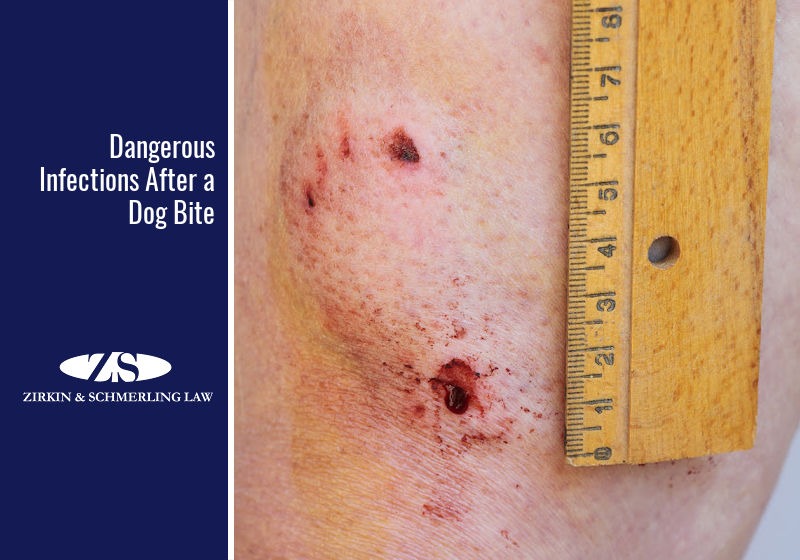
Dogs carry many bacteria in their mouths, and these can easily be transmitted through bite wounds. (Side note: human mouths also carry bacteria, and human bites can also become dangerously infected.)
If you or your child has been bitten by a dog to the point where the dog’s teeth have pierced the skin, you have to be extremely cautious and watch out for dog bite infection symptoms. Even if you don’t need stitches or surgery, and even if the wound hasn’t bled very much, you should still visit a doctor within 8 hours to head off any possible infections. This is especially crucial if you have diabetes or are immunocompromised.
Immediate steps to take for your dog bite injury:
- Wash the wound thoroughly with warm water and mild soap. Make sure to irrigate (pour running water on) the wound for 5-10 minutes.
- Apply antibiotic cream. (You can buy this over the counter.)
- Wrap the wound in a sterile bandage or cloth.
- Visit the doctor.
Steps the doctor may take:
- The doctor will probably clean out the bite again with water or saline solution. The CDC suggests a 35 milliLiter syringe with 7 psi (pounds per square inch) of pressure.
- In Maryland, all dogs are required by law (Code 10.06.02.10) to be vaccinated against rabies at the age of 4 months, but if the dog can’t be traced to quarantine or if the dog’s owner didn’t follow the law, the doctor will be concerned about rabies. In this case, the CDC recommends that the wound be irrigated with a povidone-iodine solution.
Note: Rabies is not a bacterial infection; it is a viral infection that affects the nervous system.
- If there is any suspicion that the dog that bit you had rabies, you will be given a series of 4 vaccinations over a 1 month period. You will also have an injection of rabies immune globulin at the time of the first vaccination. The local health department will coordinate with the doctor for this. (Remember that you are supposed to notify animal control if you are bitten. Also, any doctor who treats a dog bite in Baltimore County is obligated to contact Animal Control.)
- The doctor will probably give you a tetanus booster shot if you haven’t had one within the past 5 years. Tetanus is a life-threatening infection caused by Clostridium Tetani bacteria that is found in dirt, dust, and manure; it can enter the body through cuts and scrapes as well as puncture or dog bites wounds.
There are only 50 cases of actual tetanus per year, and as long as you have a tetanus vaccine or booster shot, you don’t need to worry.
- The doctor will use an antibiotic ointment on the wound and will probably prescribe a precautionary oral antibiotic as well. According to the American Academy of Family Physicians (AAFP), antibiotics most often prescribed are:
- Amoxicillin
- Clindamycin
- Doxycycline
- Penicillin VK plus dicloxacillin
- A fluoroquinolone
At home:
- Change the bandage several times a day.
- Watch for signs of infection.
Types of infection
Roughly 50% of dog bites introduce bacteria such as:
- Staphylococcus
- Streptococcus
Signs of infection:
- Redness or swelling on or around the bite
- Pain
- A fever
- Flu-like symptoms
- Blistering or oozing around the wound
- Swelling or inflammation of the joints
- Headache
- Diarrhea
- Nausea and vomiting
- Red streaks near the bite
- Night sweats
Dogs’ mouths can also have these bacteria:
Dog Bite Infection Symptoms:
- Blisters around the bite wound within hours of the bite
- Redness, swelling, draining pus, or pain at the bite wound
- Fever
- Diarrhea and/or stomach pain
- Vomiting
- Headache and/or confusion
- Muscle or joint pain
According to the NIH, 50% of clinically infected wounds showed multiple pathogenic organisms.
If left untreated, these infections can lead to:
- Cellulitis: a serious bacterial skin infection
- Heart attack
- Kidney failure
- Gangrene: This is a potentially fatal condition that happens when blood flow to a large area of tissue is cut off due to an infection
- Need for finger, toe, or limb amputation: For example, a woman in Texas who had received minor bites to her hand and leg developed an infection caused by the Capnocytophaga canimorsus bacteria in her dog’s saliva and ended up having both legs amputated below the knee and all of her fingers except for one thumb amputated.
- Sepsis: This is when an infection travels throughout the body. It can lead to tissue damage, organ failure, and death. Almost 270,000 Americans die as a result of sepsis each year.
It’s clear that dog bites can be deadly, even if the bites don’t seem serious at first glance. It is vital that you monitor your wound site and general health and that you consult a medical professional.
Zirkin & Schmerling is here to help
The dog bite laws in Maryland are difficult to navigate without an experienced dog bite attorney on your side.
You may feel pressured by your insurance company or the dog’s owner’s insurance company to settle your case quickly and accept a modest payment for your injuries and resulting infections. But this doesn’t account for the long-lasting physical, mental, and financial damage you may suffer. The effects of a dog attack aren’t always immediately noticeable.
Never accept any payment before discussing your options with a Maryland dog bite lawyer. Doing so could end your ability to seek the compensation you truly need to recover from the attack.
If you need legal help, contact the dog bite attorneys at Zirkin & Schmerling at 410-753-4611 to schedule a free case evaluation today.
